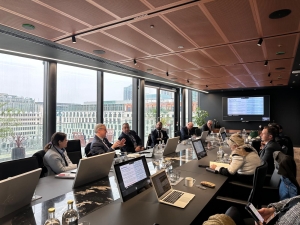


(Posted on 03/04/25)
The SEA-CARE working group concluded its third session in February by confirming commitments to share key data to secure common objectives.
Highlighting a need to look beyond ‘top-level’ data to pinpoint the root causes of casualties, attendees discussed specific datasets that could enrich findings drawn from Inmarsat’s Global Maritime Distress and Safety System (GMDSS) distress alert data. Crew welfare surveys, for example, offered a precious resource for developing a more holistic understanding of maritime safety, members agreed.
SEA-CARE is an industry working group launched last year by Maritime London and Inmarsat Maritime, a Viasat company, to improve safety standards across global shipping,
“If we look at safety data as a pyramid, what we report on at the top is the number of distress calls, but when we come down the pyramid, we get to the root causes of those top-level issues,” commented Peter Broadhurst, co-chair of SEA-CARE and Vice President of Safety & Regulatory at Inmarsat Maritime. “Using other datasets to derive a more complete picture of what’s behind the problems at the top could be key to effecting real change and reducing the frequency of serious incidents at sea.”
Several participants agreed to share data from their own organisations – including Andrew Bell, a member of the CHIRP Maritime Advisory Board; Steven Jones, founder of the Seafarers Happiness Index; and Lydia Ferrad, International Transport Workers’ Federation (ITF) Accredited Representative to the IMO.
CHIRP – Confidential Human Factors Incident Reporting Programme – owns and operates a reporting system for incident and near-miss data that participants agreed could help to determine the underlying safety deficiencies behind the consistently high distress call figures reported by Inmarsat. There was also consensus that data from the Seafarers Happiness Index and surveys conducted by ITF would provide invaluable insight into the crew welfare-related issues that may influence the frequency of marine casualties.
“It has long been Inmarsat’s ambition to gather more datasets outside of pure GMDSS data to supplement its reports and create a more holistic outlook of safety in the maritime sector,” said Jos Standerwick, co-chair of SEA-CARE and CEO of Maritime London. “If we combine the data that Inmarsat receives regarding distress calls with information on the nature of casualties from CHIRP and on seafarers’ lived experience from the Seafarers Happiness Index and ITF surveys, it could go a long way to helping us achieve our common goal.”
Inmarsat Maritime is a Viasat company and continues to power the digitalisation of the maritime industry. With over 40 years of experience, Inmarsat Maritime offers reliable and innovative solutions that enable ship owners and operators to stay connected, navigate safely, enhance operational efficiency, and ensure crew welfare.
AtoB@C Shipping, a subsidiary of ESL Shipping, has announced the successful delivery of Fleximar, the... Read more
Western Bulk, together with reputable Norwegian partners A/S J. Ludwig Mowinckels Rederi, Premium Maritime... Read more
Pacific Basin Shipping Limited, one of the world’s leading dry bulk shipping companies, has announced... Read more
Columbia Group anticipates a period of strong expansion as an increasing number of international shipowners... Read more
Norse?Ship Management has expanded its use of Smart Ship Hub’s high frequency sensor data and... Read more
As the maritime industry gears up to welcome the IMO’s STCW bullying and harassment training amendments... Read more
NORDEN has acquired the cargo activities of Taylor Maritime in Southern Africa (previously operated... Read more
Philippos Ioulianou, Managing Director of EmissionLink, has warned the IMO’s decision to delay... Read more
VIKAND has highlighted the need for cultural change in the maritime sector as reports of bullying, harassment... Read more
The maritime industry is experiencing a period of significant transformation, driven by rapidly evolving... Read more